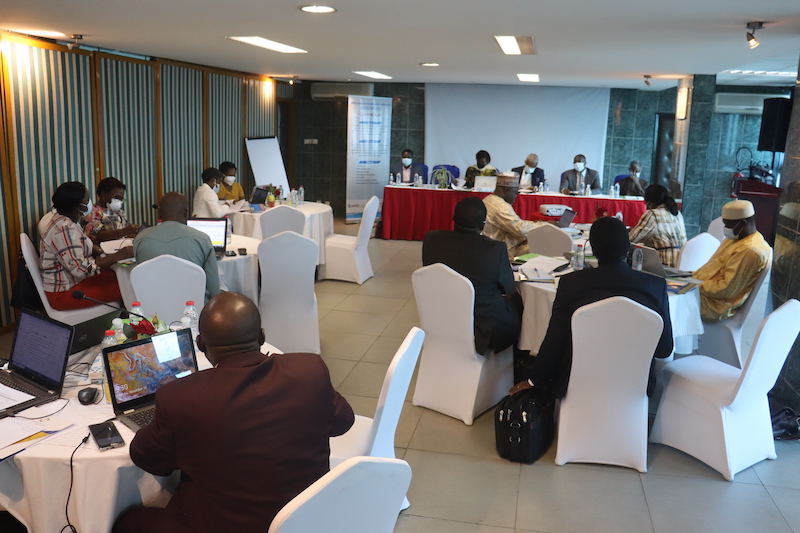The Direction de la lutte contre la Maladie, les Epidémies et les Pandémies (DLMEP), COVID-19 Incident Manager, in the Cameroon Ministry of Health, Dr. Etoundi Mballa has declared that university communities are at risk regarding COVID-19 and should therefore be more involved in the fight to manage the pandemic.
He was speaking at the opening ceremony of the kick-off meeting for the ‘Improve COVID – 19 Communication, Advocacy and Community Engagement at the University level and in Neighboring Communities’ project funded under the American Rescue Plan Act funding aimed at supporting vulnerable countries to deal with the effects of COVID-19 better. This was on 22nd November 2021 at Hôtel Résidence la Falaise, in Douala.

Dr. Etoundi, noted that sensitization is key in any strategy, and pointed out that the challenge in this new project will be to bring together universities and operational units.
A cross section of the participants at the kick-off meeting
Dr Conrad Nkuo Toh, Permanent Secretary of the Cameroon One Health Platform (NOHP), thanked AFROHUN for involving the NOHP in its work. He mentioned activities like helping with mapping of the One Health resources in Cameroon as well as the recently concluded Global Health Case Competition. He reported that the case competition inspired the government to conduct a similar competition among civil society actors, with regard to vaccination against COVID-19 in Cameroon.
Professor Mofor, the Ministry of Higher Education (MINESUP) representative thanked all the participants for their presence, which she noted is a sign of their commitment to supporting AFROHUN and USAID work in the country. She also thanked AFROHUN for the efforts in making collaboration among universities possible. “With COVID-19 effect in the country and the vaccine hesitancy, this work is very much appreciated. With the university community, we know there is very much to do; research, sensitization of the population and increase knowledge of benefits of vaccination”, she said.
Dr. Stephen Wazeh, Global Health Security Agenda Specialist at USAID Mission in Cameroon, said that Cameroon is a country of concern in term of zoonotic diseases. Therefore, cooperation with USAID will continue for many years in the foreseeable future. He emphasized the importance of the ARPA-supported project in the context of COVID-19 vaccine resistance, even among academics.
He noted that the USAID Mission in Cameroon and the Africa One Health University Network (AFROHUN) have had very fruitful co-operation for a long time. He said although the funds for the new project are limited, it is a good start, and the Mission is committed to look for more resources. He noted that the mission of the project is to contribute to the mobilization of Cameroonians to take up COVID-19 vaccination. “There is vaccine hesitancy even among academics which is concerning. Vaccination is very low and sensitizing the university communities is very important”, he said.

The speakers during the opening ceremony of the kick-off meeting
The AFROHUN Regional Program Manager, thanked USAID for the support already provided to AFROHUN-Cameroon for e-learning capacity building. She also thanked the universities and the ministries for taking part in the AFROHUN activities. She appealed to AFROHUN Cameroon and partners to not take the project for granted but work harder and lay ground for even more support in future. “The first time, 69 faculty were trained in e-learning and cascaded the training to a further 120 colleagues, while for RCCE, 41 were trained and they in turn trained 700 students, who then went down to community level and engaged community members on COVID-19 issues”, she shared. She therefore noted that this second grant from the Mission is a sign of trust in the network and assured the Mission that AFROHUN and partners will deliver as expected to ensure value for money.
In his welcome remarks, Professor Gregory Halle Ekane, the Dean Faculty of Health Sciences at University of Buea and member of the AFROHUN Leadership Summit, noted that COVID-19 has proved a major challenge and there is need for strategies to deal with it as it is likely to be around much longer than initially thought. In this, he noted that AFROHUN has a major role to play and therefore appreciated the ARPA funding which will support the university network to make a contribution. “The grant has come in at the right time; the role of the university has not been harnessed before to be impactful. With this help, we will be able to achieve more results in dealing with COVID-19 with focused engagement of university communities and training of journalists”, he promised.
The two-day meeting was attended by representatives from key government ministries, including health, communications, higher education, the National One Health Platform, deans, faculty and implementing partners.
